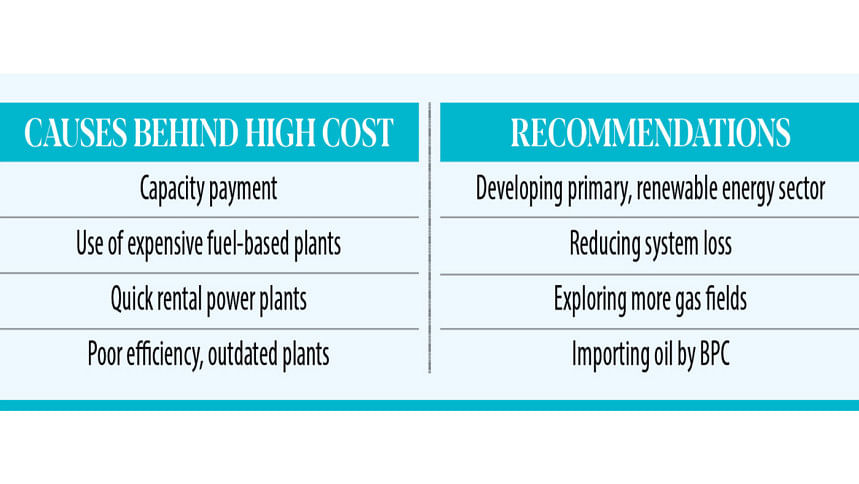Explore alternative power sources

Capacity charges for idle power plants, theft in the name of system loss, wastage and dependency on imported gas and fuel without exploring alternatives are the main causes behind high energy costs, said speakers at a dialogue yesterday.
Centre for Policy Dialogue (CPD) organised the event titled "Energy and Power Sector in the National Budget for FY2022-23" at a city hotel.
CPD urged the government to allocate more in the budget for the power transmission and distribution, rather than for its generation.
Though the country has achieved the milestone of 100 percent electrification, people are far from getting affordable and uninterrupted power. The government should focus on exploring alternatives due to the hike in prices of gas and fuel in the international market, said CPD.
CPD Research Director Dr Khondaker Golam Moazzem, during his keynote presentation, said the capacity payment to private sector power plants, including rental and quick rentals, has gone up to Tk 26,505 crore in FY2022 from Tk 5,600 crore in FY2018.
"It would be Tk 31,600 crore in FY2023. This capacity payment obligation has forced the government to move for increasing power tariff," he said.
Moazzem mentioned that the country's surplus electricity -- which was termed an overgeneration capacity -- has increased to 10,764 MW in 2021-22 from 8,231 MW in 2020-21 with a jump to 42.12 percent from 37.37 percent.
The current total electricity generation is 25,556 MW and the highest generation was 14,782 MW on April 16 this year.
He also said the length of transmission lines has increased during FY2022 by 5.5 percent, while the distribution lines increased by only 2.5 percent, which are the major reasons behind poor load management.
On the other hand, per unit cost has been increasing over the years. It has increased by 11.8 percent, to Tk 6.61 per kilowatt-hour from Tk 5.91/kwh, in FY2022 from FY2017.
Rise of generation cost in IPP plants by 14.6 percent and by 11.1 percent in public plants resulted in a rise in average generation cost.
Capacity payment, use of expensive fuel-based plants, quick rental power plants, poor efficiency, and outdated plants are some of the reasons behind the high unit cost.
Buet professor and energy expert M Tamim said, "On one hand, we are buying 150-180 million cubic feet of gas per day from the high-priced international spot market. On the other hand, only in Titas -- the largest gas distribution company -- at least 150 million cubic feet are being stolen per day."
"Why are we not blocking the loopholes? In the gas sector, the system loss should not be allowed up to 0.25 percent for the leak. How could Titas allow a loss of up to 7-8 percent?" he asked.
Tamim said the country aggressively needs to pay attention to the development of the primary energy sector.
Former DU professor of Geology Badrul Imam said the recent technical faultier in Bibiyana gas field showed the unsheathed situation of the country's gas sector.
"Four or five wells of the field remained shut down for some days and the crisis was felt all across the country. Over 50 percent of gas came from Bibiyana. We need to explore more gas fields," he said.
He said in the last 25 years only 25-26 wells were drilled while there are huge prospects for gas and oil in the country as it is the biggest delta in the world.
"Mostly the private companies import furnace oil. They charged the Bangladesh Power Development Board Tk 92 per litre, while per litre oil costs Tk 72-74 if the government imports the furnace oil through state-owned Bangladesh Petroleum Corporation," said Prof Shamsul Alam, senior vice president of Consumers Association of Bangladesh.
"The government could save Tk 8,100 crore in a year if they import oil by BPC," he added.
Power Cell Director General Mohammad Hossain, who was the special guest of the dialogue, said the capacity charge is nothing but the cost of the investment.
"When a private owner builds a power plant and Bangladesh Power Development Board (BPDB) is the single buyer, it has to pay a demurrage if unable to buy electricity from the plant," he said.
Prof M Tamim and Imran Karim, president of the Bangladesh Independent Power Producers Association (BIPPA), echoed the Power Cell DG.
They also claimed that there is no overcapacity in the country. Though the government mentioned the capacity being over 25,000 MW, the actual capacity is 16,000 MW.
The dialogue was chaired by CPD executive director Dr Fahmida Khatun.

 For all latest news, follow The Daily Star's Google News channel.
For all latest news, follow The Daily Star's Google News channel. 




Comments